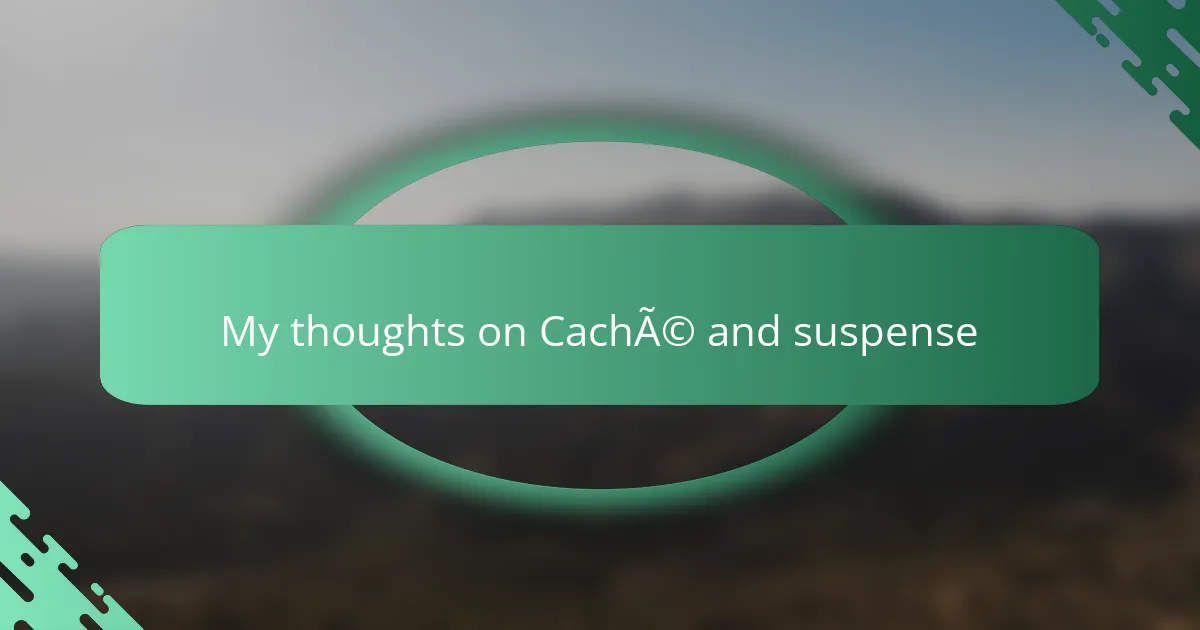Key takeaways
- French cinema reflects societal complexities, notable in films like “Caché,” which explores themes of surveillance, guilt, and voyeurism.
- “Caché” employs minimalistic storytelling and long takes to create tension, inviting viewers to confront uncomfortable truths.
- Key themes include memory and accountability, prompting reflection on personal hidden narratives and the moral implications of observing others.
- Viewers are encouraged to engage critically with the film, leading to varied interpretations and discussions about human nature and morality.
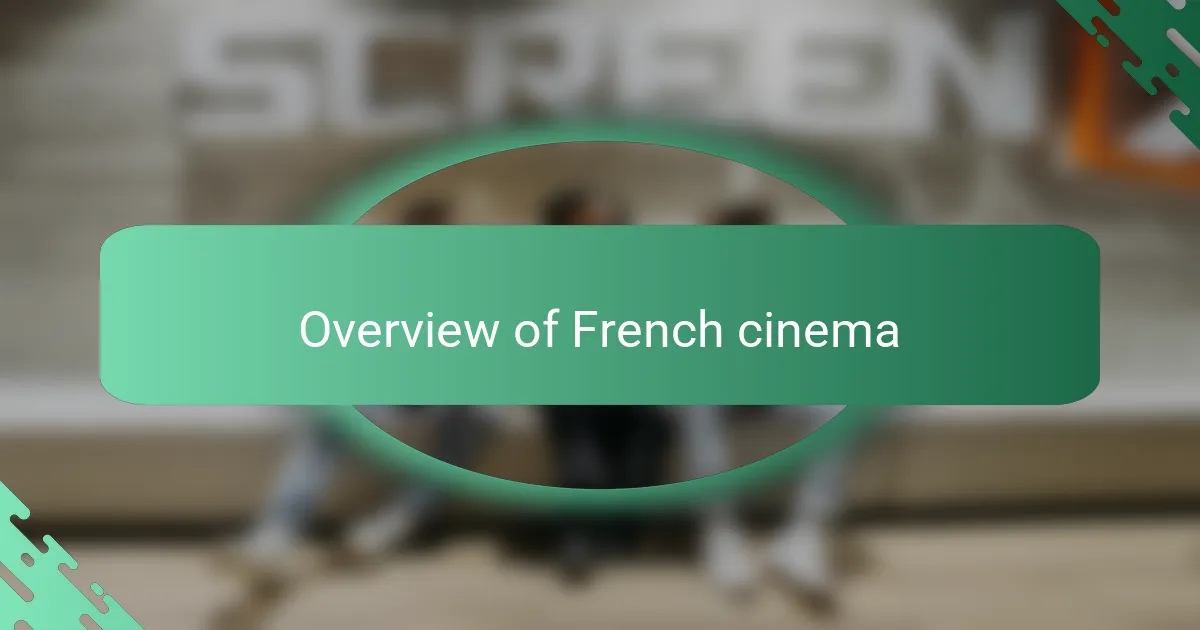
Overview of French cinema
French cinema has a rich history that often mirrors the complexities of its society. From the groundbreaking works of the New Wave in the 1960s to contemporary films that tackle modern issues, French cinema continually evolves. I find it fascinating how these films often push boundaries, inviting viewers to reflect on deep philosophical questions.
The artistry in French films is often marked by an emphasis on character development and atmosphere. I remember watching “La Haine,” which opened my eyes to the stark realities of urban life in France. It’s intriguing how these narratives resonate globally; have you ever felt a connection to a character so profound that it lingered with you long after the credits rolled?
Moreover, the French approach to suspense often departs from conventional techniques. I appreciate how films like “Caché” create tension through subtlety rather than loud action. This quiet intensity makes me wonder: what truly evokes fear in us? The answers, as presented in French cinema, can be both uncomfortable and thought-provoking.
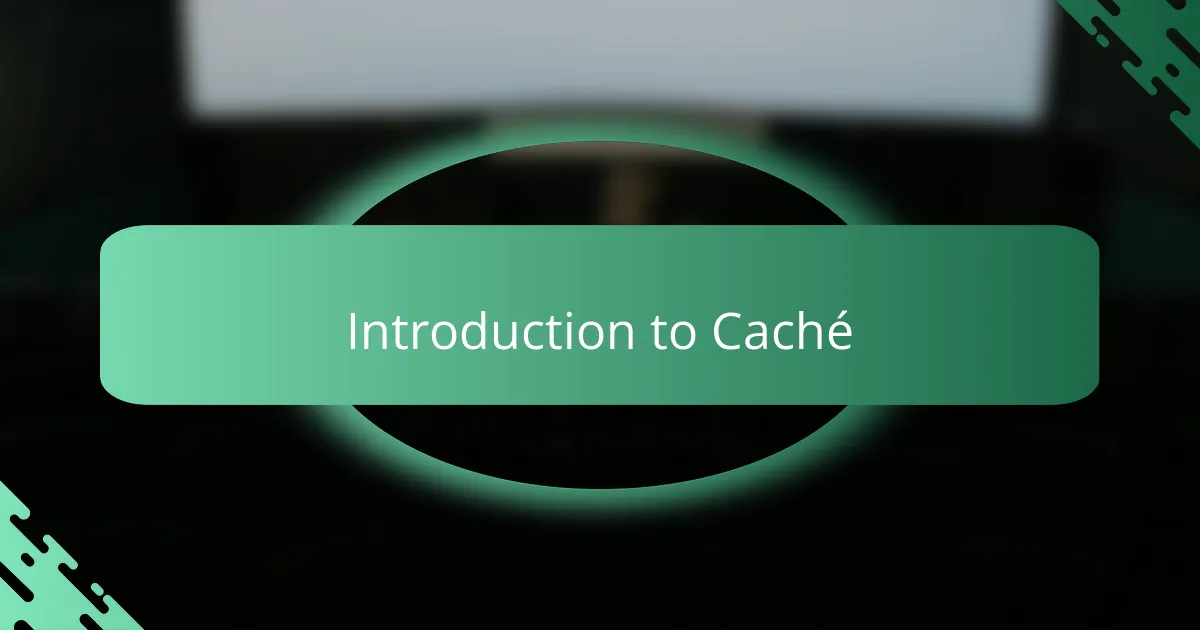
Introduction to Caché
Caché, directed by Michael Haneke, is a captivating exploration of surveillance, guilt, and the complexities of human relationships, all set against the backdrop of a seemingly ordinary French suburb. What struck me most about this film is its unique ability to create an atmosphere of unease, forcing the viewer to confront uncomfortable truths about privacy and the past. I vividly remember watching it for the first time; the tension in the room seemed to mirror the ever-present anxiety on the screen, leaving me deeply reflective afterwards.
- The film is shot in a distinctive style, often using long takes that emphasize voyeurism.
- It poses provocative questions about memory and accountability, resonating with personal experiences.
- The minimalistic score heightens the suspense, drawing viewers into its unsettling world.
- Haneke’s subtle storytelling style requires active engagement, inviting interpretations and discussions.
- The dynamic between the characters reflects the broader societal implications of hidden truths.
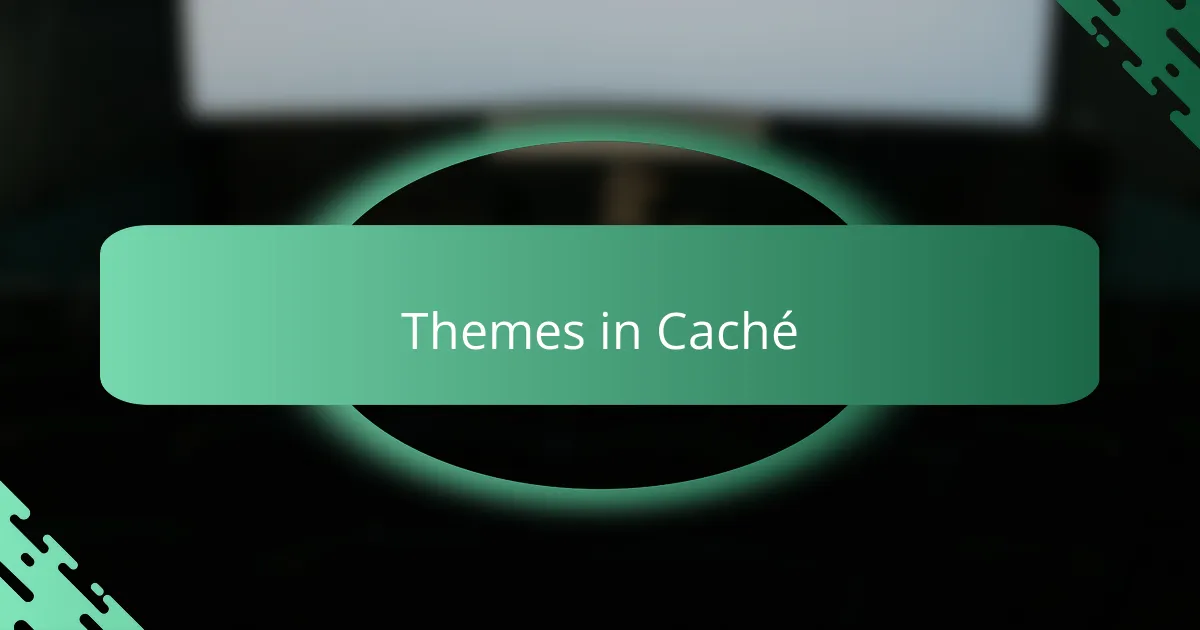
Themes in Caché
The themes in “Caché” are both haunting and profound, making them linger in my thoughts long after viewing. One key theme is the idea of voyeurism, which resonates deeply with me. Every long take feels like an intrusion, almost forcing me to question my own tendency to observe rather than engage. Have you ever caught yourself looking rather than acting? It’s unsettling when you really think about it.
Guilt also plays a significant role in the film, delving into how our past actions shape our present. I found myself reflecting on the nature of accountability, especially as the characters grapple with hidden truths. It made me wonder—how often do we hide parts of our lives, fearing the consequences of revelation? The film masterfully portrays the weight of unresolved guilt, pushing me to confront my own hidden emotions.
Memory, too, is a prominent theme that I couldn’t ignore. The way “Caché” explores how our recollections can be distorted or suppressed struck a chord with me. I realized that our perceptions can be incredibly fragile. Have you ever felt that a memory does not quite match reality? This theme left me pondering the reliability of our own narratives, a thought that lingers much like the film itself.
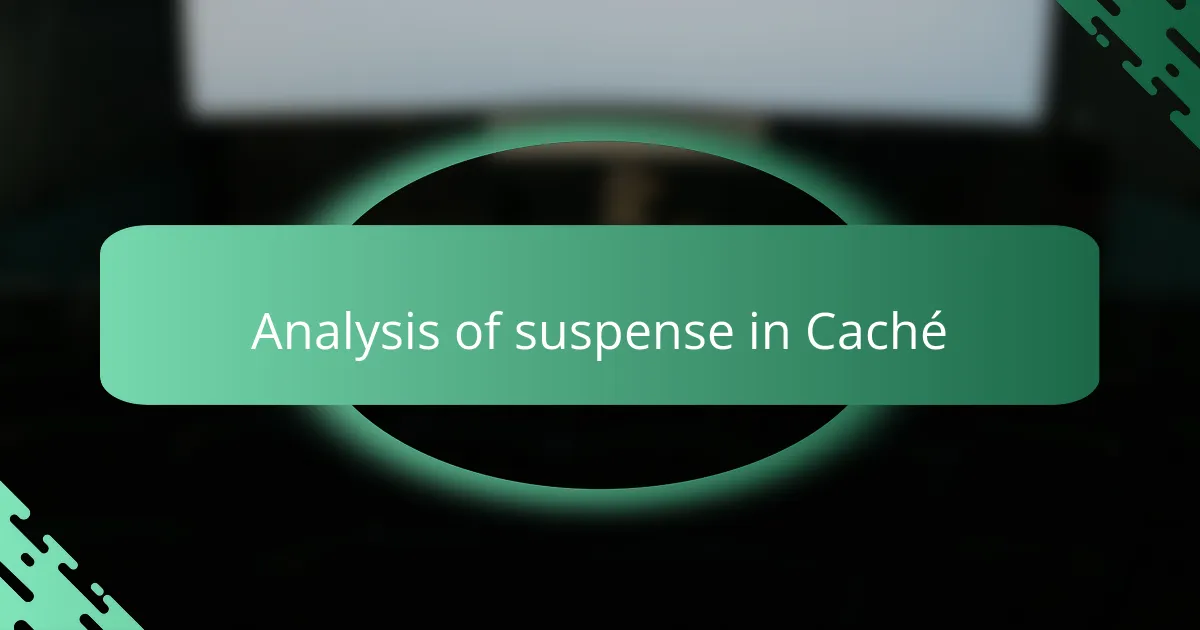
Analysis of suspense in Caché
In “Caché,” suspense is masterfully crafted through the film’s unique approach to storytelling. The long takes create a lingering discomfort, making me acutely aware of my own voyeuristic tendencies. I recall feeling as though I were an accomplice in the characters’ secrets, which compelled me to question my own values. Have you ever felt implicated in someone else’s hidden life just by watching?
The minimalistic score accentuates the tension, allowing silence to become a character of its own. I found this eerily effective, as the absence of loud music or dramatic sound cues left me hanging on every subtle movement and glance. It’s a stark reminder that sometimes, what isn’t said can be just as impactful as spoken words. Did you notice how that silence creates a sense of foreboding that’s hard to shake?
Moreover, the dynamics between the characters give rise to an uncomfortable suspense that challenges the viewer’s sense of morality. As I watched the protagonists navigate their interactions, I felt a weight of unspoken truths. It really drove home the point: how often do we encounter real-life conflicts tied to hidden grievances? This psychological tension serves as a mirror, reflecting uncomfortable realities that linger long after the credits roll.
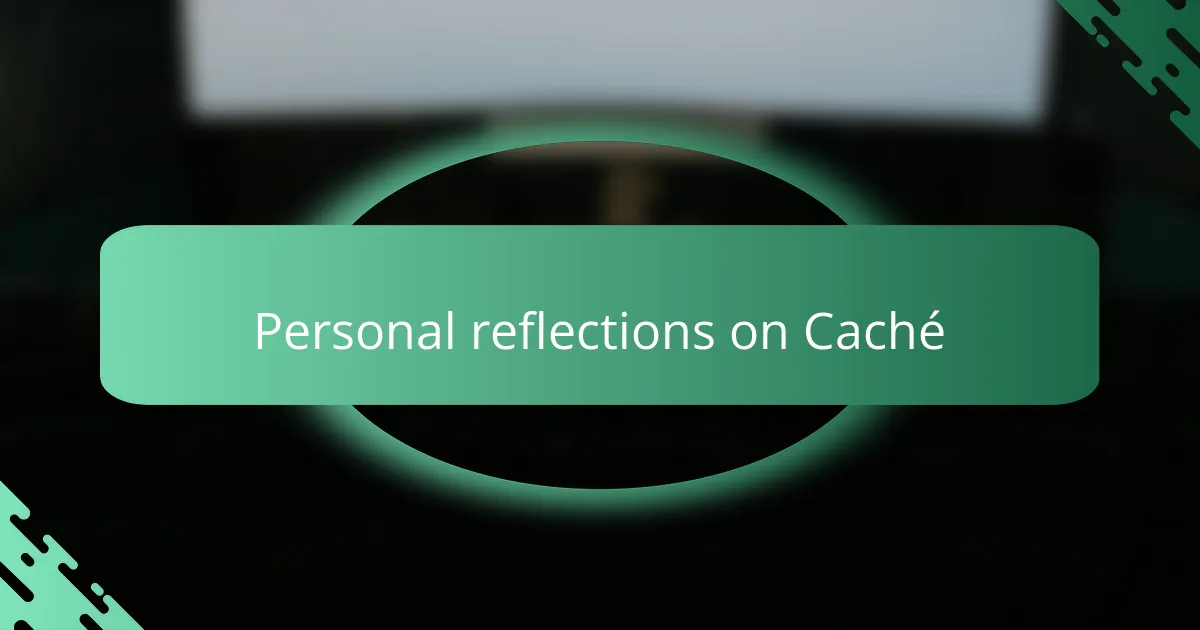
Personal reflections on Caché
The first time I watched “Caché,” I felt as if I had stepped into a psychological maze. It captivated me with its quiet intensity, each frame requiring my full attention. I couldn’t shake off that sense of dread; how often in life do we ignore the shadows lurking just out of sight? The film made me confront the unsettling idea that sometimes the most chilling truths are the ones we choose to overlook.
As the story unfolded, I found myself reflecting deeply on the theme of guilt. It struck a personal chord, making me revisit my own experiences with accountability. I wondered—how do we carry the weight of our past secrets? The film’s portrayal of concealed emotions left me pondering long after the credits rolled, feeling that even our mundane lives can harbor complex narratives waiting to be revealed.
What truly haunted me was the sense of voyeurism and the discomfort that came with it. As I watched the characters live their lives under the camera’s gaze, I couldn’t help but ask myself if I had ever been a silent observer in my own life. This insight made me realize that “Caché” isn’t just about watching others; it’s also about how we navigate our own existence in a world brimming with hidden layers.
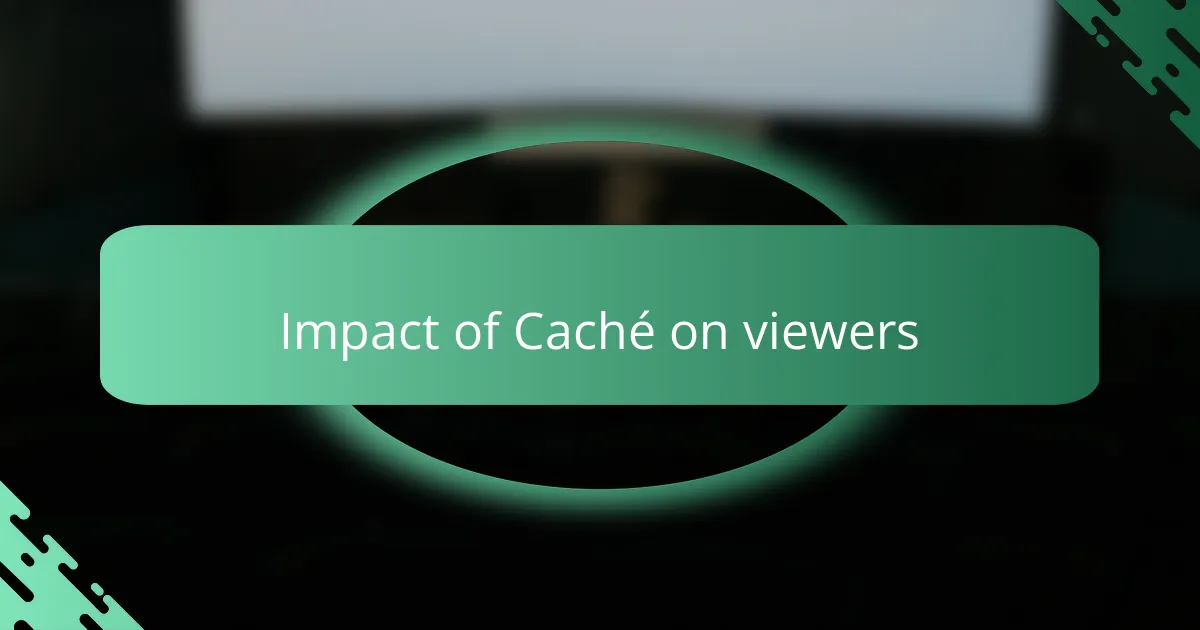
Impact of Caché on viewers
When I think about the impact of “Caché” on viewers, I recall how unsettling it felt to watch the tension build slowly throughout the film. The sense of paranoia and discomfort is palpable, often leaving me pondering the implications of surveillance and guilt long after the credits rolled. I believe it forces the audience to confront the darker aspects of human nature, making it difficult to shake off those thoughts.
The film also beautifully illustrates the concept of voyeurism—by becoming absorbed in the characters’ lives, we, too, become complicit in their hidden struggles. Each viewer’s experience can vary significantly, as it depends on personal histories and moral viewpoints. In my case, I found myself reflecting on the past and how our decisions shape our present, adding layers of emotional complexity to the viewing experience.
| Element | Impact on Viewers |
|---|---|
| Paranoia | Creates an unsettling atmosphere, leading viewers to question their surroundings. |
| Moral Ambiguity | Challenges viewers to think critically about guilt and complicity. |
| Surveillance | Encourages a dialogue on privacy and the ethics of watching others. |
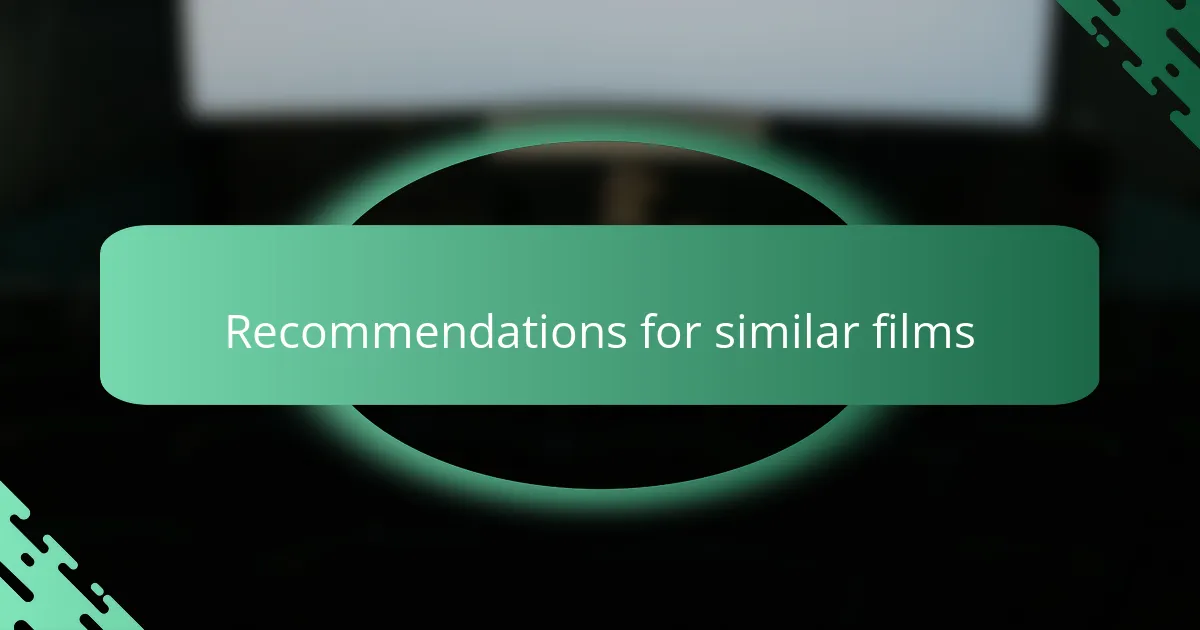
Recommendations for similar films
If you appreciated the psychological intricacies of “Caché,” you might find yourself drawn to “The Lives of Others.” This film delves into the moral dilemmas of surveillance and manipulation within an authoritarian regime, echoing the themes of paranoia and ethical boundaries that “Caché” so poignantly explores. I remember the lingering feeling of unease I had after watching it, much like the discomfort I felt with “Caché,” making it a thought-provoking experience.
Another recommendation is “Funny Games,” a film that unsettles with its unsettling portrayal of violence and the desensitization to it. I recall the palpable tension as the characters navigate a nightmare, mirroring the suspenseful aura in “Caché.” Both films expertly play with the viewer’s perception and offer deeply troubling reflections on humanity.
Here’s a list of films that share thematic connections with “Caché”:
- “The Lives of Others”
- “Funny Games”
- “Oldboy”
- “Gone Girl”
- “Prisoners”
